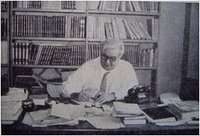Mário Ferreira dos Santos
| Mário Ferreira dos Santos | |
|---|---|
 | |
| Born |
3 January 1907 Tietê, São Paulo, Brazil |
| Died |
11 April 1968 (aged 61) São Paulo, São Paulo, Brazil |
| Residence | Brazil |
| Nationality | Brazilian |
| Era | 20th-century philosophy |
| Region | Western philosophy |
| School |
Pythagoreanism Platonism Thomism Scotism Mutualism |
Main interests | |
|
Influences
| |
Mário Ferreira dos Santos (January 3, 1907 – April 11, 1968) was a Brazilian philosopher. Born in Tietê, São Paulo,[1] Ferreira dos Santos was raised in Pelotas, Rio Grande do Sul, and graduated in Law and Social Sciences at the Federal University of Rio Grande do Sul.
A prolific writer and thinker, Ferreira dos Santos published in less than fifteen years the 45-volume Encyclopedia of Philosophical and Social Sciences.[2]
Thought
He created a philosophical system called Concrete Philosophy. His system was based on the méthode des démonstrations géométriques, with no possibility of disagreement from its assumptions – which he called "theses". The first thesis is the very foundation of his philosophy: "There is something whilst there isn't the absolute nothing", from which he draws other theses through the methods of geometry.[3]
Selected Works
- Lógica e Dialética (1954)
- Ontologia e Cosmologia (1955)
- Tratado de Simbólica (1955)
- Filosofia da Crise (1955)
- Aristóteles e as Mutações (1955)
- Noologia Geral (1956)
- Filosofia Concreta (1956)
- O Um e o Múltiplo em Platão (1958)
- Métodos Lógicos e Dialéticos (1959)
- Pitágoras e o Tema do Número (1960)
- Filosofia Concreta dos Valores (1960)
- Dicionário de Filosofia e Ciências Culturais (1963)
- Origem dos Grandes Erros Filosóficos (1965)
- A Sabedoria dos Princípios (1967)
- A Sabedoria da Unidade (1967)
See also
- Pythagoras
- Plato
- Aristotle
- Plotinus
- St. Thomas
- Duns Scotus
- Cusanus
- Pascal
- Fichte
- Hegel
- Proudhon
- Maréchal
References
- ↑ "Revista Portuguesa de Filosofia 25 (1):69 - 70 (1969) - P. Stanislavs Ladusãns - Mário Ferreira dos Santos". Retrieved 23 December 2014.
- ↑ "Publicações de Mário Ferreira dos Santos". Retrieved 23 December 2014.
- ↑ "Carlos Aurélio Mota de Souza - Mário Ferreira dos Santos y su filosofia concreta". Retrieved 23 December 2014.
External links
- https://marioferreirainenglish.wordpress.com/
- http://www.erealizacoes.com.br/autores/autores_MarioFerreiraDosSantos.asp (Portuguese)
- http://www.academus.pro.br/filosofo/marioferreira/ (Portuguese)
- https://filosofiaconcreta.wordpress.com/ (Portuguese)